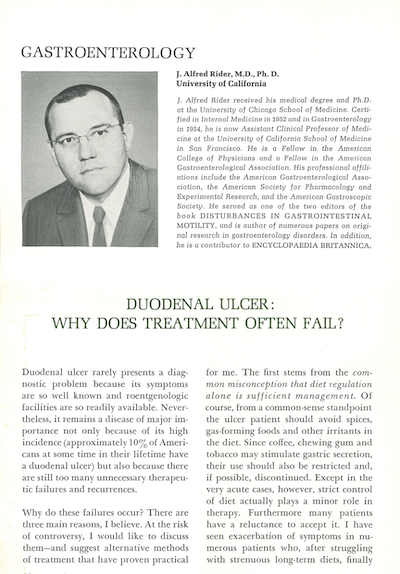ADVERTISEMENT
How Times Have Changed: Duodenal Ulcer
This Editorial is a personal reflection on an article from the Consultant archives and was written by a Consultant Editorial Board member.
Author:
Alan Lucerna, DO, FACOI
I remember when the nurse rushed in a 43-year-old patient after he had vomited large amounts of blood in the triage room. It looked like a murder scene. I was just days out of medical school and had a hard time hiding the aggregate of emotions I was feeling. I remember putting my hands in my lab coat to hide how badly they shook. The patient was found to have bleeding peptic ulcers. He was an alcoholic.
 While Dr Alfred Rider’s article was published in 1961, peptic ulcer disease (PUD) is still a common encounter today, though recent literature suggests it is on a downward trend. Dr Rider contended that treatment failure of duodenal ulcers is due to several factors: improper use of anticholinergic and antisecretory drugs, improper use of antacids, and believing that diet regulation is sufficient management. Even with cursory scrutiny, his treatment strategies would be both impractical and unpopular by today’s standards. The once- or twice-a-day dosing of current medications is a far cry from taking an antacid every half hour or so.
While Dr Alfred Rider’s article was published in 1961, peptic ulcer disease (PUD) is still a common encounter today, though recent literature suggests it is on a downward trend. Dr Rider contended that treatment failure of duodenal ulcers is due to several factors: improper use of anticholinergic and antisecretory drugs, improper use of antacids, and believing that diet regulation is sufficient management. Even with cursory scrutiny, his treatment strategies would be both impractical and unpopular by today’s standards. The once- or twice-a-day dosing of current medications is a far cry from taking an antacid every half hour or so.
In the 1980s, the discovery of Helicobacter pylori by 2 Australian scientists revolutionized the treatment of PUD to include antibiotics as the core of treatment. Discoveries in the late 20th century—such as understanding the role of prostaglandin, development of noninvasive testing (urea breath test), and better endoscopic techniques and biopsy methods—have resulted in designing effective drugs and ease of reliable diagnostic testing.
There has been a debate about whether diet plays a role in the management of PUD. Contemporary evidence shows that diet may play a minor role. Dr Rider is also right in pointing out that emotional stress can precipitate and perpetuate PUD. As a society, we are recognizing more the importance of mind-body health. Vicki Baum, an American novelist, put it best: “You don’t get ulcers from what you eat. You get them from what’s eating you.”
Alan R. Lucerna, DO, FACOI, is the Attending Physician of Emergency Medicine; Assistant Director of Emergency Medicine at Jefferson Health, Stratford; Program Director of Internal Medicine/Emergency Medicine at Rowan University-SOM/Jefferson Health/Our Lady of Lourdes Medical Center; and Associate Program Director of Emergency Medicine Residency at Rowan University-SOM/Jefferson. He has been an active member of Consultant’s Editorial Board since 2017.
Rider JA. Duodenal ulcer: why does treatment often fail? 1961;1(5):23-27.
https://www.consultant360.com/gastroenterology/duodenal-ulcer-why-does-treatment-often-fail.










